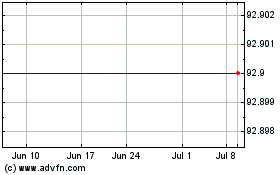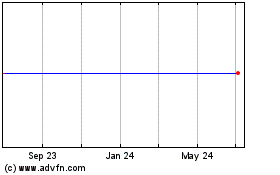ChemChina Won't Force Syngenta to Raise Prices to Make Good on Deal, CFO Says
February 08 2017 - 10:30AM
Dow Jones News
By Nina Trentmann
China National Chemical Corp. won't force Syngenta AG to raise
its prices to make good on its multibillion-dollar acquisition of
the Swiss seeds and pesticide maker, said Syngenta's chief
financial officer.
Future price increases at Syngenta won't be linked to the
planned $43 billion acquisition of Syngenta by ChemChina, CFO Mark
Patrick said in an interview Wednesday.
"I don't see a direct linkage between price increases and the
$43 billion that ChemChina pays for Syngenta," he said.
Syngenta, however, needed to make sure it was being rewarded for
its technology investments, Mr. Patrick said. The company was
prepared to "do whatever we need in order to be competitive," he
said regarding the deal.
In 2016, price increases contributed $233 million to the
company's results, Mr. Patrick said Wednesday during an analysts
call.
Syngenta's 2016 sales amounted to $12.79 billion, down from
$13.41 billion in 2015. Net income was $1.18 billion, compared with
$1.34 billion in 2015.
Syngenta Chief Executive Erik Fyrwald said the company was
confident the transaction would close in the second quarter of
2017. "The process has taken longer than we originally expected,"
Mr. Fyrwald said during the analyst call. However, he said
discussions with EU regulators were constructive and the company
expects EU regulatory approval by April 12.
The delay in retaining regulatory approval which has led to
state-owned ChemChina extending its offer several times since
February 2016 has had a "very limited impact" on Syngenta's balance
sheet, Mr. Patrick said.
Nevertheless, the company booked restructuring and impairment
charges of $390 million in 2016, compared with $300 million in
2015. Part of that was caused by transaction-related expenses for
advice by banks and other service providers, Mr. Patrick said.
The company is now working with ChemChina to flesh out "an
optimal financing model" for after the deal closes, he said.
Despite the differences in accounting and financial modeling
between Switzerland and China, the dialogue was "engaging," Mr.
Patrick said.
As part of ChemChina, Syngenta could be looking at mergers and
acquisitions, he said. Assets that might be spun off by Bayer AG
and Monsanto Co. to gain regulatory approval for their planned
takeover could be opportunities worth exploring for Syngenta, Mr.
Patrick said.
"We are very open to the M&A activity that is out there," he
said. The company could also increase its innovation spending from
around 9% or 10% of sales annually, he said.
The company will remain a stand-alone entity after the closure
of the ChemChina deal, Mr. Patrick said. Thus, there won't be
changes to the company's tax headquarters in Basel,
Switzerland.
Syngenta supports a move to unify the country's corporate tax
code, he said. On Sunday, voters in Switzerland will vote in a
referendum on plans to make changes to the tax system, which
currently allows cantons to set their own corporate tax rates.
Should the plan go forward, it would be "neutral" to Syngenta, Mr.
Patrick said.
The company in 2016 reported a tax rate before restructuring of
15%, compared with 17% for 2015.
Write to Nina Trentmann at Nina.Trentmann@wsj.com
(END) Dow Jones Newswires
February 08, 2017 10:15 ET (15:15 GMT)
Copyright (c) 2017 Dow Jones & Company, Inc.
Syngenta (NYSE:SYT)
Historical Stock Chart
From Oct 2024 to Nov 2024

Syngenta (NYSE:SYT)
Historical Stock Chart
From Nov 2023 to Nov 2024
